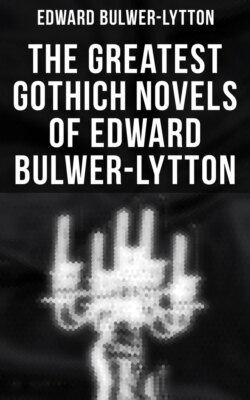Читать книгу The Greatest Gothich Novels of Edward Bulwer-Lytton - Эдвард Бульвер-Литтон - Страница 34
На сайте Литреса книга снята с продажи.
CHAPTER 3.VII.
ОглавлениеTable of Contents
Il ne faut appeler aucun ordre si ce n’est en tems clair et
serein.
“Les Clavicules du Rabbi Salomon.”
(No order of spirits must be invoked unless the weather be clear
and serene.)
Letter from Zanoni to Mejnour.
My art is already dim and troubled. I have lost the tranquillity which is power. I cannot influence the decisions of those whom I would most guide to the shore; I see them wander farther and deeper into the infinite ocean where our barks sail evermore to the horizon that flies before us! Amazed and awed to find that I can only warn where I would control, I have looked into my own soul. It is true that the desires of earth chain me to the present, and shut me from the solemn secrets which Intellect, purified from all the dross of the clay, alone can examine and survey. The stern condition on which we hold our nobler and diviner gifts darkens our vision towards the future of those for whom we know the human infirmities of jealousy or hate or love. Mejnour, all around me is mist and haze; I have gone back in our sublime existence; and from the bosom of the imperishable youth that blooms only in the spirit, springs up the dark poison-flower of human love.
This man is not worthy of her—I know that truth; yet in his nature are the seeds of good and greatness, if the tares and weeds of worldly vanities and fears would suffer them to grow. If she were his, and I had thus transplanted to another soil the passion that obscures my gaze and disarms my power, unseen, unheard, unrecognised, I could watch over his fate, and secretly prompt his deeds, and minister to her welfare through his own. But time rushes on! Through the shadows that encircle me, I see, gathering round her, the darkest dangers. No choice but flight—no escape save with him or me. With me!—the rapturous thought—the terrible conviction! With me! Mejnour, canst thou wonder that I would save her from myself? A moment in the life of ages—a bubble on the shoreless sea. What else to me can be human love? And in this exquisite nature of hers—more pure, more spiritual, even in its young affections than ever heretofore the countless volumes of the heart, race after race, have given to my gaze: there is yet a deep-buried feeling that warns me of inevitable woe. Thou austere and remorseless Hierophant—thou who hast sought to convert to our brotherhood every spirit that seemed to thee most high and bold—even thou knowest, by horrible experience, how vain the hope to banish fear from the heart of woman.
My life would be to her one marvel. Even if, on the other hand, I sought to guide her path through the realms of terror to the light, think of the Haunter of the Threshold, and shudder with me at the awful hazard! I have endeavoured to fill the Englishman’s ambition with the true glory of his art; but the restless spirit of his ancestor still seems to whisper in him, and to attract to the spheres in which it lost its own wandering way. There is a mystery in man’s inheritance from his fathers. Peculiarities of the mind, as diseases of the body, rest dormant for generations, to revive in some distant descendant, baffle all treatment and elude all skill. Come to me from thy solitude amidst the wrecks of Rome! I pant for a living confidant—for one who in the old time has himself known jealousy and love. I have sought commune with Adon-Ai; but his presence, that once inspired such heavenly content with knowledge, and so serene a confidence in destiny, now only troubles and perplexes me. From the height from which I strive to search into the shadows of things to come, I see confused spectres of menace and wrath. Methinks I behold a ghastly limit to the wondrous existence I have held—methinks that, after ages of the Ideal Life, I see my course merge into the most stormy whirlpool of the Real. Where the stars opened to me their gates, there looms a scaffold—thick steams of blood rise as from a shambles. What is more strange to me, a creature here, a very type of the false ideal of common men—body and mind, a hideous mockery of the art that shapes the Beautiful, and the desires that seek the Perfect, ever haunts my vision amidst these perturbed and broken clouds of the fate to be. By that shadowy scaffold it stands and gibbers at me, with lips dropping slime and gore. Come, O friend of the far-time; for me, at least, thy wisdom has not purged away thy human affections. According to the bonds of our solemn order, reduced now to thee and myself, lone survivors of so many haughty and glorious aspirants, thou art pledged, too, to warn the descendant of those whom thy counsels sought to initiate into the great secret in a former age. The last of that bold Visconti who was once thy pupil is the relentless persecutor of this fair child. With thoughts of lust and murder, he is digging his own grave; thou mayest yet daunt him from his doom. And I also mysteriously, by the same bond, am pledged to obey, if he so command, a less guilty descendant of a baffled but nobler student. If he reject my counsel, and insist upon the pledge, Mejnour, thou wilt have another neophyte. Beware of another victim! Come to me! This will reach thee with all speed. Answer it by the pressure of one hand that I can dare to clasp!
